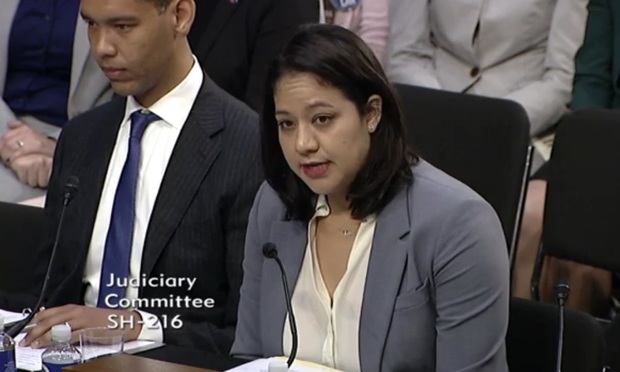Lawyer in Immigrant's Abortion Case Says Kavanaugh Imposed 'Unjustifiable' Hurdle
"There were so many barriers placed in front of Jane; the additional hurdle Judge Kavanaugh placed in front of her was unjustifiable," lawyer Rochelle Garza testified Friday.
September 07, 2018 at 02:21 PM
4 minute read
 Rochelle Garza testifies Friday in the Senate Judiciary Committee.
Rochelle Garza testifies Friday in the Senate Judiciary Committee.
U.S. Supreme Court nominee Brett Kavanaugh ignored high court precedents in ruling against an immigrant pregnant teen seeking an abortion, her lawyer and a New York University legal scholar on Friday told the U.S. Senate committee weighing his nomination.
Kavanaugh's dissenting opinion in Garza v. Hargan has become a major issue for supporters of the landmark abortion decision, Roe v. Wade. The judge disagreed with the en banc majority of the U.S. Court of Appeals for the D.C. Circuit, which ruled the teen's abortion could go forward despite the Trump administration's efforts to delay it. The en banc decision reversed an earlier panel ruling by Kavanaugh in which he approved a delay of 11 days in order for the government to continue what had been an unsuccessful search for a sponsor for the teen.
Kavanaugh spent two days testifying that he respects the Supreme Court precedent of Roe, and Democrats challenged him over his ruling in the Garza case. Democrats portrayed Kavanaugh as a jurist who'd be willing to “unsettle” Roe were he confirmed to the Supreme Court.
Four Democratic senators on Friday homed in on testimony by lawyer Rochelle Garza of Garza & Garza in Brownsville, Texas, and Melissa Murray of New York University Law School to support their beliefs that Kavanaugh had mischaracterized the issue in his dissent and misapplied Supreme Court precedents.
Garza was appointed guardian ad litem for the teenager, Jane Doe, held in U.S. custody in Texas. Garza told the committee, “There were so many barriers placed in front of Jane; the additional hurdle Judge Kavanaugh placed in front of her was unjustifiable.”
Kavanaugh, Garza said, justified the 11-day delay his initial order required because, he said, Jane needed a “support network” to make a “major life decision.” But Garza said, “Jane had already made her decision long before. She had already satisfied all of the requirements for any minor in Texas and a state court judge in Texas had issued an order that made clear that she could consent to the abortion on her own.”
When questioned a number of times about his opinion in the Garza case during his three days before the committee, Kavanaugh said he was applying the high court's parental consent precedents on abortion to a minor who was alone in this country and he viewed a sponsor as a proxy for parental consent.
Murray countered Kavanaugh's testimony, saying the Garza case was not a “parental consent case.” Jane Doe had “guardians upon guardians” appointed by the courts to advise her, Murray told the Senate panel.
Murray testified that Kavanaugh ignored the holding in the justices' 1979 parental consent decision, Bellotti v. Baird, which said state parental consent statutes must include a judicial bypass for minors whose parents do not consent and who could show they were mature enough or it was in their best interests to have an abortion.
Kavanaugh, Murray said, also veered from the high court's recent ruling in Whole Woman's Health v. Hellerstedt, which requires a weighing of the benefits and burdens of abortion restrictions. “He did not even engage with Whole Woman's Health,” Murray said.
None of the committee's Republican members questioned Garza and Murray, among the nearly 30 witnesses who testified Friday. Those witnesses included Big Law appellate stars who praised Kavanaugh as open-minded and thoughtful.
Read more:
Efforts to Unsettle 'Roe' Move Toward Supreme Court, as Kavanaugh Faces Senate
Justices Shut Down DOJ's Drive to Punish ACLU Lawyers in Abortion Case
ACLU Spurns U.S. Solicitor's Call for Attorney Sanctions in Abortion Case
DC Circuit's Millett, Who Backed Teen's Abortion Right, Finds Role Model in RBG
This content has been archived. It is available through our partners, LexisNexis® and Bloomberg Law.
To view this content, please continue to their sites.
Not a Lexis Subscriber?
Subscribe Now
Not a Bloomberg Law Subscriber?
Subscribe Now
NOT FOR REPRINT
© 2025 ALM Global, LLC, All Rights Reserved. Request academic re-use from www.copyright.com. All other uses, submit a request to [email protected]. For more information visit Asset & Logo Licensing.
You Might Like
View All
Insurance Policies Don’t Cover Home Depot's Data Breach Costs, 6th Circuit Says

'Religious Discrimination'?: 4th Circuit Revives Challenge to Employer Vaccine Mandate
2 minute read
Standing Spat: Split 2nd Circuit Lets Challenge to Pfizer Diversity Program Proceed

Fight Over Amicus-Funding Disclosure Surfaces in Google Play Appeal
Trending Stories
- 1Bar Report - Jan. 20
- 2Saxton & Stump Lands Newly Retired Ex-Chief Judge From Middle District of Pa.
- 3Judicial Admissions and Medical Malpractice Defense
- 4South Florida Attorney Charged With Aggravated Battery After Incident in Prime Rib Line
- 5'A Death Sentence for TikTok'?: Litigators and Experts Weigh Impact of Potential Ban on Creators and Data Privacy
Who Got The Work
J. Brugh Lower of Gibbons has entered an appearance for industrial equipment supplier Devco Corporation in a pending trademark infringement lawsuit. The suit, accusing the defendant of selling knock-off Graco products, was filed Dec. 18 in New Jersey District Court by Rivkin Radler on behalf of Graco Inc. and Graco Minnesota. The case, assigned to U.S. District Judge Zahid N. Quraishi, is 3:24-cv-11294, Graco Inc. et al v. Devco Corporation.
Who Got The Work
Rebecca Maller-Stein and Kent A. Yalowitz of Arnold & Porter Kaye Scholer have entered their appearances for Hanaco Venture Capital and its executives, Lior Prosor and David Frankel, in a pending securities lawsuit. The action, filed on Dec. 24 in New York Southern District Court by Zell, Aron & Co. on behalf of Goldeneye Advisors, accuses the defendants of negligently and fraudulently managing the plaintiff's $1 million investment. The case, assigned to U.S. District Judge Vernon S. Broderick, is 1:24-cv-09918, Goldeneye Advisors, LLC v. Hanaco Venture Capital, Ltd. et al.
Who Got The Work
Attorneys from A&O Shearman has stepped in as defense counsel for Toronto-Dominion Bank and other defendants in a pending securities class action. The suit, filed Dec. 11 in New York Southern District Court by Bleichmar Fonti & Auld, accuses the defendants of concealing the bank's 'pervasive' deficiencies in regards to its compliance with the Bank Secrecy Act and the quality of its anti-money laundering controls. The case, assigned to U.S. District Judge Arun Subramanian, is 1:24-cv-09445, Gonzalez v. The Toronto-Dominion Bank et al.
Who Got The Work
Crown Castle International, a Pennsylvania company providing shared communications infrastructure, has turned to Luke D. Wolf of Gordon Rees Scully Mansukhani to fend off a pending breach-of-contract lawsuit. The court action, filed Nov. 25 in Michigan Eastern District Court by Hooper Hathaway PC on behalf of The Town Residences LLC, accuses Crown Castle of failing to transfer approximately $30,000 in utility payments from T-Mobile in breach of a roof-top lease and assignment agreement. The case, assigned to U.S. District Judge Susan K. Declercq, is 2:24-cv-13131, The Town Residences LLC v. T-Mobile US, Inc. et al.
Who Got The Work
Wilfred P. Coronato and Daniel M. Schwartz of McCarter & English have stepped in as defense counsel to Electrolux Home Products Inc. in a pending product liability lawsuit. The court action, filed Nov. 26 in New York Eastern District Court by Poulos Lopiccolo PC and Nagel Rice LLP on behalf of David Stern, alleges that the defendant's refrigerators’ drawers and shelving repeatedly break and fall apart within months after purchase. The case, assigned to U.S. District Judge Joan M. Azrack, is 2:24-cv-08204, Stern v. Electrolux Home Products, Inc.
Featured Firms
Law Offices of Gary Martin Hays & Associates, P.C.
(470) 294-1674
Law Offices of Mark E. Salomone
(857) 444-6468
Smith & Hassler
(713) 739-1250










